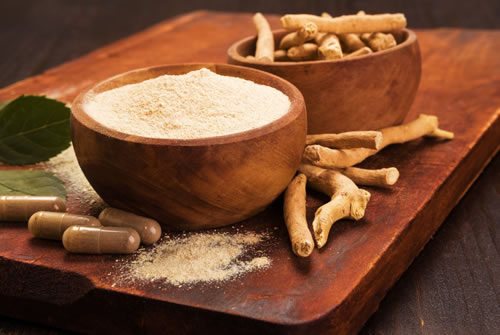Ashwagandha
Posted on Apr 27th 2023

Ashwagandha: The Ancient Adaptogen of Ayurveda
Rooted deeply in the ancient medicinal system of Ayurveda, Ashwagandha (Withania somnifera) has risen to global prominence, revered for its adaptogenic qualities. Often referred to as "Indian Ginseng", this powerful herb's name translates from Sanskrit as "smell of the horse", denoting its distinctive aroma and the traditional belief in its ability to imbue strength and vigor akin to that of a stallion.
Ashwagandha's Legacy
Ashwagandha's legacy stretches back over 3,000 years in India, where it has been employed to combat various ailments. It primarily grows in the drier regions of India, Middle East, and parts of Africa.
Bioactive Compounds and Properties
The magic of Ashwagandha lies in its bioactive compounds called withanolides, which imbue the herb with its therapeutic properties.
Health Benefits
- Stress and Anxiety: As an adaptogen, Ashwagandha helps the body cope with external stresses, including toxins in the environment, as well as internal stresses, such as anxiety and insomnia.
- Enhancing Brain Function: Preliminary studies suggest the herb can improve memory, reaction time, and cognitive abilities.
- Boosting Immunity: Traditionally used to bolster immunity post-illness, it has demonstrated immunomodulatory effects.
- Thyroid Modulation: Ashwagandha may improve thyroid function, especially in cases of an underactive thyroid.
- Reproductive Health: It's believed to enhance virility and has been used as a remedy for infertility.
- Anti-Inflammatory: Contains potent antioxidant properties that help combat the oxidative stress and inflammation in the body.
How to Incorporate Ashwagandha
- Capsules: A common way to consume, especially for specific doses.
- Powders: Can be mixed into smoothies, teas, or warm milk for a traditional preparation known as "Ashwagandha milk".
- Teas: Combined with other herbs for a synergistic effect.
Words of Caution
- Pregnancy and Breastfeeding: Ashwagandha is traditionally used to induce miscarriages, so it's advised to avoid during pregnancy. Consult with a healthcare provider during breastfeeding.
- Auto-immune diseases: May potentiate symptoms of diseases like multiple sclerosis, lupus, and rheumatoid arthritis.
- Medication Interactions: If you're on thyroid medications, sedatives, or drugs for diabetes, it's vital to consult a healthcare professional before integrating Ashwagandha into your routine.
In Conclusion
Ashwagandha's rich tapestry of health benefits is woven with tales of ancient traditions and modern science. As we continue exploring nature's pharmacy, it's herbs like Ashwagandha that underscore the power and wisdom inherent in the plant kingdom. As with any herbal remedy, respecting its potency and understanding its proper use ensures we harness its benefits while honoring its ancient roots.
 Loading... Please wait...
Loading... Please wait...